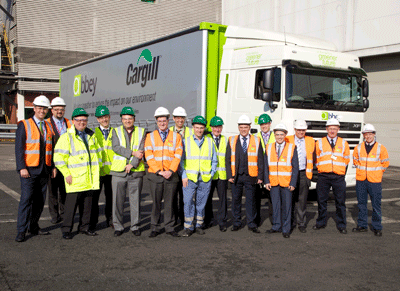
Abbey Logistics Group/Cargill
Abbey Logistics Group and food producer Cargill have worked together for over a decade and 2011 saw the partnership grow further.
Cargill’s Trafford Park plant blends glucose syrup, and Abbey has to collect time critical loads to avoid halting production. In 2011 the pair took measures to improve OTIF (On Time In Full) and put the Manchester site to the top of Cargill’s European league tables.
This meant the creation of one team. Three Abbey staff relocated from its base in Liverpool to Trafford Park in Manchester – and these planners became responsible for all haulage movements coming on site. If a vehicle is late Abbey arranges for a shunter to pick up a spare tank and get the load out before onward delivery – forcing other hauliers to improve performance and Abbey and Cargill to work together as a team.
Performance is now measured on a daily, not monthly, basis and OTIF has only trended one way: up.
The judges singled out "clear evidence of sharing data and resources" and "good interaction of teams". They also said the twin cargo trailer that both parties have developed – which can carry 21,000lts of glucose syrup and 26 pallets in the same trailer - as "a true jointly developed innovation solution". The trailers are set to save 92,500 empty road miles a year on this single delivery line – a saving that would only have happened with the partnership.
ByBox/Cable & Wireless Worldwide
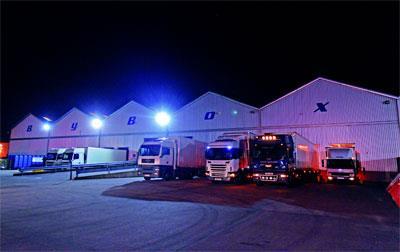
ByBox and Cable & Wireless Worldwide (CWW) have worked together since 2004 and is a partnership that has developed on improved processes, reduced costs and increased turnover.
ByBox delivers, before 8am every day, some 18,000 drop boxes to 1,400 locations across the UK. This means that CWW engineers can pick up parts conveniently before their first job. Before this engineers had the start to their working day delayed, every day, because they had to travel to the nearest depot to pick up parts. The judges singled out this "tripling of engineer productivity" as one of the reasons for shortlisting the partnership.
Furthermore, as the partnership has developed CWW has decommissioned a 57,000ft2 warehouse it had previously used to store stock – part of the "real evidence of results and benefits for both parties" cited by the judges.
In February 2011 ByBox took on the management of maintenance operations at CWW. It now handles some 15,000 maintenance requests annually from the Shetlands to Jersey. Its Thinventory management system has been fully integrated to CWWs SAP system to give full visibility of 60,000 stock items in 38 stock locations across the country. Furthermore since September 2011 CWW has been able to sell-off over £1m of excess inventory.
The judges said there was "real evidence of innovation" between both firms and that "order times had been transformed (and quantified)".
KBR/FTX Logistics/Ministry of Defence
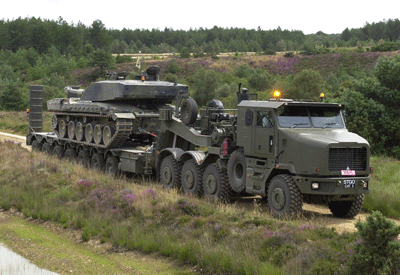
KBR/FTX Logistics have worked with the Ministry of Defence (MoD) since 11 December 2001 – when the two parties signed a 20 year partnering contract for a heavy equipment transport service.
The partnership sees KBR/FTX manage a fleet of 92 heavy equipment transporters, one third of which have to be operated in peace and war time by KBR/FTX. The heavy equipment transporters are designed to carry 72 tonne Challenger II tanks at speeds of 50mph to the frontline during military operations.
The judges said that it "doesn’t get more long term than this" and that KBR/FTX is "clearly doing the job the MoD wants".
KBR/FTX also use Sponsored Reserves, a new type of Army Reserve who can be called up into military service while continuing their civilian employment, providing support to the armed forces. These staff are affiliated to regular tank transporter squadrons for operations and more than 150 have now served in either Iraq or Afghanistan – meaning the MoD can draw on a wide range of experience that would otherwise have been lost to the army.
The partnership has also reduced road traffic accidents involving heavy equipment transporters with the deployment of a VORAD anti-collision system, the cost of which was shared 50:50 with the MoD. Accient repair costs have fallen, as have insurance premiums (a total of £385,000 to date).
The judges singled out "lots of evidence of excellent supplier performance" and a partnership that "could not be easily replaced".
Keystone Distribution/McDonalds
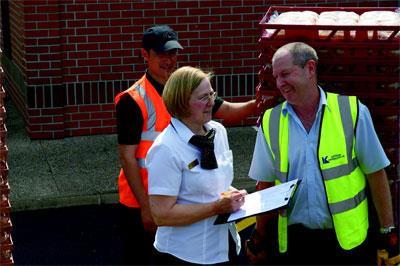
Keystone Distribution makes more than 200,000 multi-temperature deliveries with its fleet of 140 vehicles to one customer – McDonalds. Keystone is central to McDonalds supply chain and 2011 was a pivotal year in the pair working together as a partnership.
In 2011 Keystone deployed KOMPASS (Keystone Operational Management, Planning & Analytical Supply Chain Solution). The software programme was designed to bring together a range of platforms used by both parties and has become the nerve centre for all the demand and supply chain planning. For McDonalds it includes a front-end that all restaurant managers can use.
The result has been increased forecasting and restaurant order accuracy – with order modifications reduced by 42% and late order additions reduced by 57%. Customer complaints at McDonald restaurants have also reduced by a third. Judges described the results as "great" and "clear sharing of data and resources to develop an outstanding service model
It is not just IT where Keystone and McDonalds are partners. The judges singled out cooking oil to biodiesel innovation for making the entry stand-out and being a "very real partnership". During 2011 the amount of cooking oil collected and converted to biodiesel created a CO2 saving of 1,333 tonnes.
The judges described Keystone and McDonalds as a "very close relationship" and "forward thinking".
Yusen Logistics/BSH Home Appliances
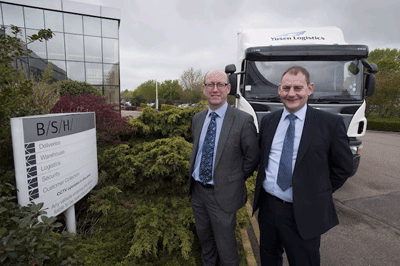
Yusen Logistics, formerly NYK Logistics, provides an integrated service for small trade customers to BSH Home Appliances, the UK subsidiary of BSH Bosch & Siemens Hausgeräte.
The two firms have worked together since 2000, and the 12 year partnership bucks the trend of the average length of a logistics contract – just under four years. Only 4.6% of contracts last for ten years plus. Over the same time BSH has seen 40% volume growth, while Yusen has reduced the total freight cost per unit delivered by 7.55%, compared to pre-2000 statistics. Overall freight costs, as a percentage of costs at BSH, have fallen 6.3% as the pair have grown in the UK together.
The judges said there was "good evidence of long term collaboration" and praised "excellent back up material and evidence of service improvements" in the award submission.
Yusen and BSH share the risk of under-utilising trucks. If there is spare capacity Yusen has to fill vehicles with other goods. There is full systems integration between both firms, with shared IT as well as sales and accounts data supporting the supply chain.
Yusen has used its partnership with BSH to grow its white goods network and services to the wider market, while BSH has seen its share of sales through the small trade channel rise from 9% to 39% since the partnership began.
"They seem to be ‘married’ to each other and replacing them would be difficult," the judges said.











